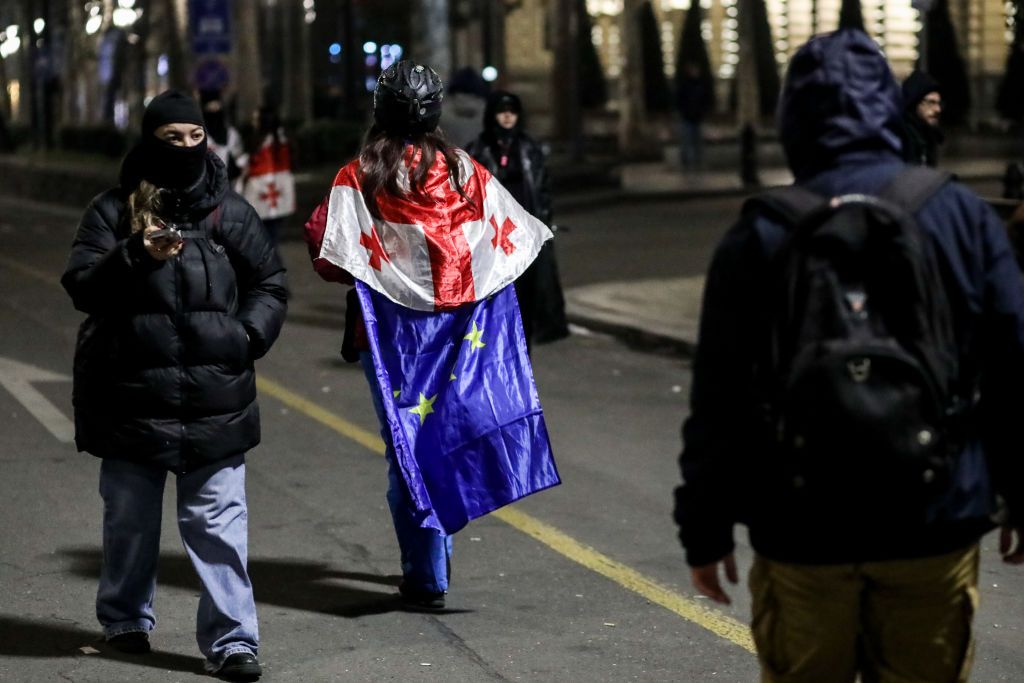Summarize this content to 2000 words in 6 paragraphs
The Organization for Security and Cooperation in Europe (OSCE) called on the Georgian government to take action to improve its electoral processes in its final report on Georgia’s October parliamentary elections, published Dec. 20. The pro-Russian Georgian Dream party claimed a sweeping victory in the Oct. 26 elections amid widespread allegations of fraud and intimidation. The disputed results triggered mass demonstrations in Tbilisi. Georgia’s laws provide “an adequate basis for democratic elections,” but recent legislation “marked a step backwards” and election day was characterized “by a tense atmosphere and widespread intimidation of voters,” the OSCE report said. The OSCE also cited unequal financial resources, a polarized media landscape, and the underrepresentation of women as issues undermining the election. “Numerous issues noted in our final report negatively impacted the integrity of these elections and eroded public trust in the process,” said Eoghan Murphy, who led the OSCE election observation mission to Georgia.”To safeguard the democratic principles currently at stake in Georgia, it is imperative that the authorities urgently address all concerns.”The report recommends a number of steps the Georgian government can take to reform its electoral system. These include preventing voter intimidation, undertaking a comprehensive legislative review, changing the process for appointing election commissioners, improving campaign finance oversight, and guaranteeing vote secrecy. The OSCE Office for Democratic Institutions and Human Rights (ODIHR) does not recognize or endorse any elections, but instead provides assessments of electoral processes in order to let voters form their own conclusions. Opposition parties in Georgia refused to recognize the result of the Oct. 26 parliamentary vote and said the election was stolen. A Tbilisi court in mid-November dismissed 11 lawsuits filed by opposition parties and civil society groups challenging the result, and Georgia’s Central Election Commission confirmed Georgian Dream’s parliamentary victory on Nov. 16.The ruling party, founded by oligarch Bidzina Ivanishvili, has led Georgia closer to the Kremlin while hindering its accession to the European Union. The controversial foreign agents law adopted earlier this year led the EU to effectively freeze Georgia’s accession process. The parliamentary elections and ensuing political crisis sparked a wave of large-scale demonstrations in Tbilisi. A second round of protests kicked off when Prime Minister Irakli Kobakhidze announced that Georgia’s integration into the EU could be postponed until 2028. Protests in Georgia, explainedFor the fifth day in a row, Georgians are holding massive protests against their government in the country’s capital, Tbilisi. The brewing dissatisfaction was ignited by the country’s democratic backsliding under the leadership of the pro-Russian, increasingly illiberal government. The final straw…
!function (f, b, e, v, n, t, s) {
if (f.fbq) return; n = f.fbq = function () {
n.callMethod ?
n.callMethod.apply(n, arguments) : n.queue.push(arguments)
};
if (!f._fbq) f._fbq = n; n.push = n; n.loaded = !0; n.version = ‘2.0’;
n.queue = []; t = b.createElement(e); t.async = !0;
t.src = v; s = b.getElementsByTagName(e)[0];
s.parentNode.insertBefore(t, s)
}(window, document, ‘script’,
‘https://connect.facebook.net/en_US/fbevents.js’);
fbq(‘init’, ‘3189560391356472’);
fbq(‘track’, ‘PageView’);
window.fbAsyncInit = function () {
FB.init({
appId: 271541601613017,
cookie: true,
xfbml: true,
version: ‘v2.5’
});
}.bind(this);
(function (d, s, id) {
let js, fjs = d.getElementsByTagName(s)[0];
if (d.getElementById(id)) return;
js = d.createElement(s);
js.id = id;
// @ts-ignore
js.src = “https://connect.facebook.net/en_US/sdk.js”;
// @ts-ignore
fjs.parentNode.insertBefore(js, fjs);
}(document, ‘script’, ‘facebook-jssdk’));


